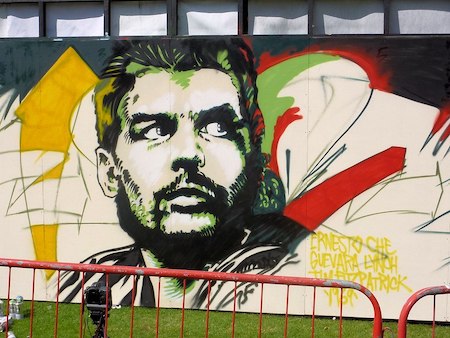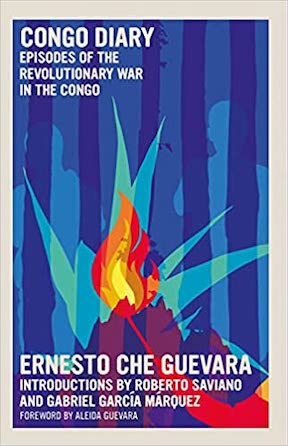If Che Guevara were alive today he would be 93. Too old to be the kind of guerrilla he had been in Cuba, the Congo and Bolivia, where he was killed on 9 October 1967 by Mario Teran, a 27-year-old military officer who shot him 9 times, presumably not just to kill him but to inflict pain and suffering. Teran and the Bolivian military had the help of the CIA, which had been tracking and tracing Guevara’s movements for years, as he knew. There was no way Che could hide from the CIA. The agency kept track of flights and passengers and the kinds of purchases guerrillas would make to camp in a jungle and launch attacks on soldiers who were well trained and in the service of a repressive regime. Che didn’t blame the CIA. Instead, he blamed “imperialism” and explained that it had “power over all the airline companies and airports” and monitored “the purchase of unusual quantities of backpacks, nylon sheeting, knives, blankets, etc.” He wasn’t up against a “paper tiger.” Soon after news of his death was announced, Che became an overnight revolutionary icon, though he was already headed in that direction. I remember seeing his image everywhere, especially in buses and taxis, when I lived in Mexico in 1975. Che is still an iconic figure, though his image has been tarnished in part by his all-too-honest account of the seven months in 1965 when he failed to foment a revolution in the Congo, not far from the shores of Lake Tanganyika, which, he explained, constantly “tempted” him and offer an escape route to friendly Tanzania. Doomed from the start, the expedition seems to have been the beginning of the end for Che who wrote, “During those last hours of our time in the Congo I felt alone.” He added “never have I felt myself so alone.” Call the Congo, Che’s “Heart of Darkness,” the place where he confronted his own inner demons and was undone by them. Too embarrassed to return to Cuba immediately after the military defeat of the guerrilla army he had assembled, he spent six months living clandestinely at the Cuban Embassy in Dar es Salaam and at a “safe house” in Prague, evading would-be assassins. Granted, Che was no Mr. Kurtz, the imperialist villain in Joseph Conrad’s novella Heart of Darkness who wants to bring civilization to the natives in the Congo, but loses faith, exclaims, “Exterminate the brutes” and carries out a policy of genocide. Still, like Kurtz, Che was disillusioned in the Congo. It wasn’t civilization he wanted to bring to the nation, but revolution and socialism. In December 1964, he addressed the UN general assembly and predicted that “Yankee Monopoly Capitalism” would soon dig its own grave. Less than a year later, he wrote that the Congolese were “the worst example of a fighter I have encountered.” His dream of revolution had turned to dust. But he got a book, perhaps his best, out of the tragedy, As the Italian novelist and investigative journalist, Roberto Saviano, wrote in July 2021, Che “probes the world with an anthropological gaze and a poetic pen.” Saviano added that he was “an excellent adventure reporter.” At the end of his Congo narrative, Che wrote, “I learned certain things. These mistakes I will never make again, others I probably will make again; and I will commit new errors.” If nothing else he was honest, as honest as he could be given his own subjectivity.
In “The Note” at the beginning of the book, the editors write that they would “like to acknowledge the effort and dedication of Commander Fidel Castro for his detailed revision of the manuscript.” Just what those revisions entailed, no has said. Still, the note makes it clear that Congo Diary is the official Cuban government version of Che’s account, which he himself edited, revised and polished from his own rough field notes. Also, his widow, Aleida Guevara—his second wife—helped ready the manuscript for publication. In 2002, when Cynthia Grenier reviewed The African Dream, aka “Che’s Secret Diary,” for The San Francisco Chronicle, she explained that in the 1970s, as an acquisitions editor for Ballantine Books, she tried and failed to obtain the U.S. rights to the diary. Regis Debray, the French intellectual, author of Revolution in the Revolution? —and briefly Che’s sidekick—told her, “The Cubans will never let them out. They’ll keep them in their archives forever.” The Cubans did keep them under wraps for nearly 40 years. But Debray underestimated Fidel and the Cubans. Publishing an edited version must have seemed better than not publishing anything at all. There isn’t a critical word about Fidel or Cuba in the published diary. If there had been something critical in the original, someone omitted it. Too bad the book wasn’t published in 1967 or 1968. It might have prevented the Che wanna-bes from committing their own militaristic errors. In her 2002 review, Grenier wrote, “The beloved revolutionary icon sounds pretty much like an old-fashioned racist when it comes to evaluating his black brothers in arms.” Che’s fans and followers will likely disagree with Grenier, but one can understand why she reached her conclusion. In his “Preface: An Initial Warning,” which begins, “This is the story of a failure,” Che wrote that he wanted the “Cubanization of the Congolese.” Ironically, what happened, he added, was the “’Congolization’ of the Cubans.” “This does not reflect a derogatory opinion of the Congolese people, but it does reflect such a view of the soldiers at that time,” he said. In Che’s eyes, the Congolese soldiers were unfit for guerrilla warfare or combat of any kind. They didn’t know how to fire a rifle, or make ready to ambush the enemy. They ran away from battle at the first sounds of gunfire. Also, they were superstitious, believed in magic and in spells, went to prostitutes in the towns, contracted venereal diseases, and, like “parasites,” lived off the peasants. “A war is not won with such troops,” Che decided early on. The longer he stayed in the Congo the more he was convinced of the futility of his dream. “We cannot by ourselves liberate a country that does not want to fight,” he wrote. The Cuban soldiers who were white, as well as Afro-Cuban, were also not to his liking. They talked revolutionary talk, but they didn’t walk the revolutionary walk. Che’s attempts to persuade them to respect the Congolese and not patronize them went nowhere. From the start, he knew he was up against the most virulent forms of imperialism he had ever encountered. The Congo, he explained, was the setting for “the cruelest and most bitter liberation struggle.” Black Africans who had led anti-colonial movements were now sadly the “lords of the revolution” who enjoyed “princely holidays.” Neo-colonialism was as bad as colonialism itself. The agents of empires aimed not just for enslavement and exploitation, but also “for the negation of the individual human being.” It was depressing. Che couldn’t speak grammatical Swahili, or overcome his own gloom, which he found embarrassing. “I am an optimist,” he told himself as though trying to escape from his “total despair.” His whiteness was his own worst enemy. “My skin color undermined everything,” he exclaimed near the end of his African sojourn. One wonders what he could have been thinking before he flew from Cuba to the Congo, with fake papers and under an assumed name, Ramon Benitez. Perhaps he believed in his own myth and in his ability to triumph against all odds. In fact, in the Congo, he often kept to himself, smoked tobacco, read books and wrote in his diary. He didn’t blend in, but rather stood out, though he identified with the Congolese peasants and the Congolese women who were treated by Congolese men “like merchandise,” he complained, and were bought and sold. There were no women in the army of “freedom fighters,” as Che called them. Congo Diary offers 34 black-and-white photos. Many depict Che smoking a pipe or a cigar, sometimes smiling, sometimes somber and looking like the Congo had aged him far more than the actual seven months he spent as “Tatu,” the not so anonymous Cuban guerrilla in the heart of darkness. Is there something to be learned from his book? Yes. Tell the truth, even if and when it hurts. “To replace colonialism with neocolonialism, or one group of neocolonialists with another group that does not look so bad,” Che wrote, “is not a correct revolutionary strategy.” Source URL |

